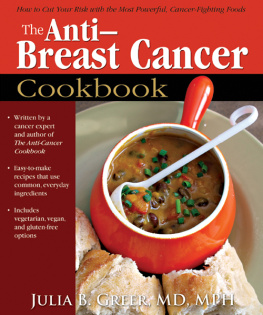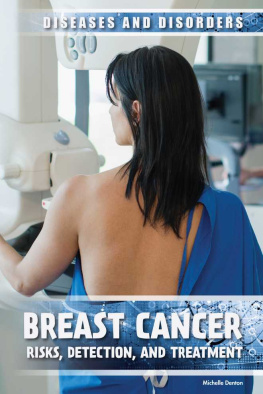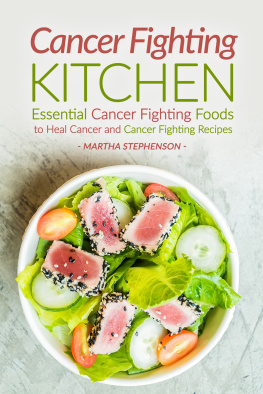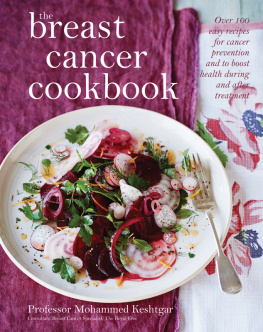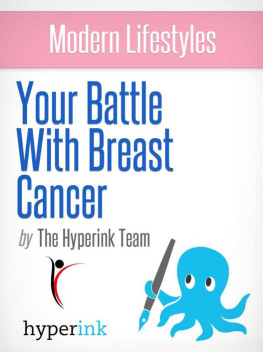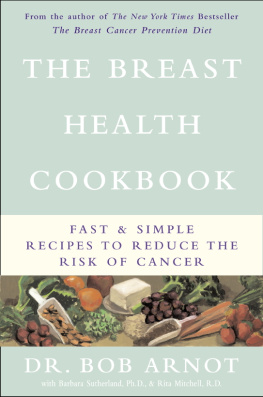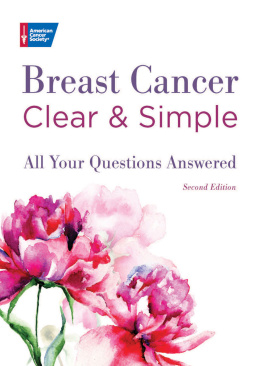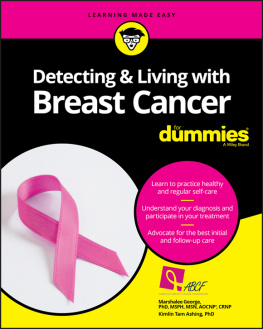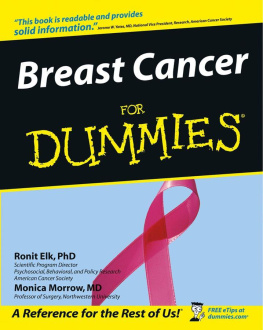Foreword
As a medical oncologist, I frequently hear patients and families inquire about what they or their loved ones should be eating. In fact, this is one of the first questions patients ask after receiving a diagnosis of cancer. The question also comes up as patients continue the cancer journey, through treatment with chemotherapy and radiation. Perhaps surprisingly, it comes up again and againwith recurrence or cure, from dying patients, or from survivors who seek cancer prevention. Food, with all its metaphors and connotations, is deeply woven into the fabric of cancer.
The medical community struggles to counsel individual patients about the role of nutrition in regard to cancer. Information is overwhelming, often contradictory, and at times derived in scientifically questionable contexts. This is not an excuse, however, for not searching for ways to effectively and clearly guide patients through this maze of information. As medical professionals, we should take our role most seriously in this endeavor and look to simplify and clarify current knowledge, then provide resources that are accessible and understandable. With these resources, we pass the baton to our patients, with the hope that they can make positive changes in their lives.
Dr. Julia Greers AntiBreast Cancer Cookbook is one such resource. More importantly, it provides a framework through which health can be integrated into practical living. This integration comes through making good food and lifestyle choices. In many cases, good lifestyle choices contribute to cancer prevention. This book will not do the work for you. It will not bring healthy anti-cancer foods to your pantry and to your table. It will, however, educate, guide, and inform you. It will coax you to make good choices for yourself and your loved ones. This book will not cure cancer. It does, however, give you the power to contribute to your overall health and well-being by offering ingredients and recipes that are known to help prevent cancer or its recurrence. And you get to help yourself or your loved one while sharing your passion for food and partaking in the warmth that preparing, cooking, and eating can bring to every person, every day.
Dr. Greer has the insight, knowledge, and common sense to bring a wonderful resource to a spectrum of individuals. For those seeking to prevent breast cancer or its recurrence, the information in this book is both scientifically sound and well displayed and presented. For food lovers who want the healthy benefits of Dr. Greers impressive accomplishments and education, it is a valuable addition to your collection. For everyone, it is a thoughtful resource for the proactive and mindful pursuit of health.
Enjoy!
Lanie Francis, MD
Assistant Clinical Professor of Medicine
University of Pittsburgh, Department of Medicine, Division of Hematology and Oncology
UPMC Cancer Centers
Acknowledgments
There is an Academy Awards list of people I should thank for supporting me on this endeavor. I would like to thank Dr. Loren Roth, for not letting me be a quitter when the going got tough, and Dr. Ron Glick, for introducing me to food and mindfulness as forms of healing. I am eternally thankful to my first mentor, Dr. Francesmary Modugno, for making me file IRB requests and do data entry so that I could more effectively understand how to conduct cancer research. I am exceptionally grateful to know two inspiring young women, Judi Holtzman Rosen and Gabrielle Lawrence Strand, who fought and beat breast cancer at a time in their lives when they should have been choosing preschools or packing healthy lunches. I am proud to call each of you my friend. Sincere gratitude goes to Gwyneth Catlin, for introducing me to beans, root vegetables, and tahini when I was in college and sharing many delightful meals and workouts. I extend great appreciation to Joe Negri, Angela Raso, Jeff Lazar, Sherrie Flick, Kurt Shaw, Eric Rotthoff, and Alex Ankeles for sharing their delicious recipesand I apologize for not using all of them in this book. I also acknowledge Dr. Judy Balk and Dr. Lanie Francis, who built careers that focus not only on healing the sick but also on incorporating good nutrition into their treatment plans. Special thanks to the beautiful and brilliant Dr. Christine Mackey, for bragging to everyone about my great cooking, and to breast cancer survivor Dr. Jamie Stern, for taking care of herself while taking care of others. Finally, I could never have written this book without my mother, who served as active shopper, accountant, and newspaper clipper, and who has demonstrated that a diet of dark chocolate and nuts really can enhance longevity.
Dedication
For Diane White
Chapter 1
All About Breast Cancer
Much has been written about diet and cancer. In 1981 Richard Doll and Richard Peto published a comprehensive review discussing avoidable causes of cancer mortality in the United States and suggested that diet accounted for about 35 percent of cancer deaths; smoking accounted for a similar percentage. Since then, thousands of studies have assessed how various foods and nutrients relate to cancer risk. A constant stream of media on the subject has made people more aware than ever. Well talk a lot about food and cancer in this book, but to have a full understanding of how dietary choices might impact breast cancer risk, its valuable to know the basics about breast cancer. Being familiar with the various forms of breast cancer and their treatments will help you to see how healthy eating fits into the bigger picture of cancer prevention.
Incidence and Prevalence
Breast cancer is the most common type of cancer diagnosed in women in the United States and is second only to lung cancer as a leading cause of cancer death in females. The National Cancer Institute estimates that in 2011, 230,480 U.S. women were diagnosed with breast cancer and 39,520 women died from it. According to the American Cancer Society, rates of breast cancer increased between 1994 and 1999 and then decreased by about 2 percent each year for the years 19992006. The decreases in annual incidence were likely the consequence of the 2002 publication of results of the Womens Health Initiative study, which found that combined estrogen and progestin hormone replacement therapy (HRT) increased the risk of breast cancer, as well as heart disease, stroke, and blood clots, in older women. Many women stopped taking postmenopausal hormones after this studys results became widely known because doctors were more reluctant to prescribe them. As an aside, other studies have shown that estrogen-only HRT, which is prescribed for postmenopausal women who do not have a uterus, might be protective against breast cancer. There was also a drop in rates of mammography during these years, which may have delayed the diagnosis of breast cancer for some women, thereby lowering perceived incidence. Rates of breast cancer are higher in countries that have been industrialized for a long time and lower in more recently industrialized countries. For instance, in East Asia (China, Japan, North Korea, South Korea, and Taiwan) the incidence of breast cancer is about 21 cases per 100,000 compared with 85 per 100,000 in western Europe and 124 per 100,000 in the United States.

The most recent statistics for breast cancer prevalence in the United States are from January 1, 2008, when approximately 2.6 million women had a history of breast cancer. The figure includes anyone still living on January 1, 2008, who had been diagnosed with cancer of the breast at any point prior to January 1, 2008, and it encompasses individuals with active disease and those who were cured of the disease.

